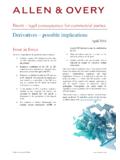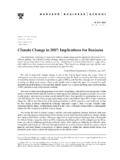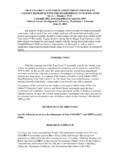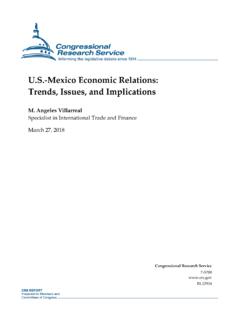Transcription of Weaver's Model of Communication and its …
1 Weaver's Model of Communication and its implications Richard B. Wells June 2, 2011 Weaver's Model of Communication and its implications I. Fallacies in the Usages of Information and Communication The most common usages of the terms "information" and " Communication " are not applicable with objective validity when the object of discourse is the mind-brain system. Neither can these terms be validly employed in the description of biological objects except in a very specific and limited context. Over the past several years some writers have adopted some very careless habits of misusing these terms in ways that promote ontological fallacies and misguided metaphors. Softening the meaning of technical terms used in any science damages the science, and persistent misusages over time tend to render the words we use to explain Nature meaningless.
2 All sciences adopt common words found in everyday use and put them to some more specific use within the contexts of the sciences in question. A great deal of the time expended in a science education is devoted to teaching and learning the special and limited contexts of the technical vocabulary of the science. It is not a misleading metaphor to say that a student in one of the special sciences a learns a new language that to people outside his chosen field of study is nothing else than a foreign language. The inability of many scientists to be able to meaningfully communicate with laypersons is due in large part to this. When a technical word is highly abstract to begin with yet is also a word in the common vocabulary of society, the potential for serious misunderstandings and even mischief is great.
3 Such is the case with "information" and " Communication " as these terms are used and misused in psychology, neuroscience, and biology. Let us examine this. The common dictionary definitions of the noun "information" derive from the verb "inform." There are three primary usages of this word in English: inform, [ informen; OFr. enformer; L. informare, to shape, fashion, represent, instruct; in, in, and formare, to form, from forma, form, shape.] 1. (a) to give form or character to; to be the formative principle of; (b) to give, imbue, or inspire with some specific quality or character; to animate. 2. to form or shape (the mind); to teach. [Rare.] 3. to give knowledge of something to; to tell; to acquaint with a fact, etc. syn. acquaint, apprise, instruct, notify, tell, teach, enlighten. As one might guess from the list of synonyms, the most common usages of "inform" take their context from definition (3) and, to a lesser extent, from definition (2).
4 Neither of these contexts, however, are objectively valid in neuroscience or biology and have only a sharply limited valid context in psychology. Definition (1), particularly (1a), is the only context having scientific validity for mind-brain theory, for neuroscience, for biology, and for much of psychology. Now consider the word "information": information, n. [OFr. information; L. informatio (-onis), a representation, an outline, sketch, from informare, to give to, to represent, to inform.] 1. an informing or being informed; especially, a telling or being told something. 2. something told; news; intelligence; word. 3. knowledge acquired in any manner; facts; data; learning; lore. 4. a person or agency answering questions as a service to others. 5. in law, an accusation of a criminal offense, not by indictment of a grand jury but by a public officer such as a prosecutor.
5 Syn. intelligence, notice, advice, counsel, instruction, news. None of these definitions are objectively valid for neuroscience, biology, or mind-brain theory. 1 Weaver's Model of Communication and its implications Richard B. Wells June 2, 2011 The root meaning of "information" in English is tied to the idea of representation, and this term, within the contexts relevant to these sciences, denotes an epistemological primitive having a very tightly restricted Realdefinition. It is worth noting that while information is an entirely appropriate English translation of informatio, a precise English rendering from Latin grammar would mean informing, just as the noun hunting (L. venatio) is defined from to hunt (venor, -ari) and denotes an action as in progress. The key point here is the context of information as one that involves a minimum of two people, who we will here call the informer and the informee.
6 It is this context that invalidates the word in neuroscience usages. Furthermore, the term as defined above is invalid for biology because the objects of biology (molecules, cells, etc.) cannot in any objectively valid way be said to "know something." The very popular phrase "DNA information" is misused in such a way as to suggest that a cell's DNA in some mysterious manner "informs the cell" how to develop or behave. A scientist who understands DNA molecules might know how a cell will develop or behave, but this information (in the context of definition 1 above) is in the mind of the scientist, not a fictitious "mind of the cell." Even in this context, the scientist will not understand how to interpret the appearance of a strand of DNA unless he has first learned DNA theory.
7 To say a cell "has DNA information" as some kind of inner quality or property of the cell qua cell is vitalism nothing more and nothing less. A scientist should never say, "the DNA tells me such-and-such"; he should say "I infer such-and-such based on the DNA structure of the cell." The DNA qua molecule tells him nothing. The current fallacies in the scientific usages of "information" in biology and neuroscience stem from a false ontology known as the mind-body division. This is Descartes' error, viz. the regarding of mind and body as two different real substances (res cogitans and res extensa). The metaphysical fallacy has long been recognized, and modern empirical science is attempting to deal with it by reductionism: "mind is not a thing; it is an emergent property of brain and a mere epiphenomenon.
8 " But this also posits a real division between mind and body and then declares the former to be not-objectively-real after all. It takes a high degree of training to effect this sort of delusional hypnosis in scientific habits of thinking. However much a scientist may contemn the idea of mind when it comes to applying the term to other people, he does not really doubt the reality of his own mind. The seeming paradoxes that swirl around "the mind-body problem" all disappear as soon as one recognizes that the actual empirical object of neuroscience and psychology is the Organized Being (human being) as a whole, and that the division of science concepts into mind-concepts and body-concepts is nothing more than a convenient logical and mathematical division with no ontological import whatsoever.
9 Mind and body are not physical concepts; they are mathematical concepts. Critical epistemology teaches us this (Wells, 2006), and the theory of mental physics is based in part on this recognition (Wells, 2009). Once the idea of information gains a foothold in neuroscience, biology and psychology, it is quite natural that ideas from the discipline of Communication theory should likewise become incorporated into the lexicons of these sciences. It is not the contention of this paper that either information or Communication should be banned as legitimate concepts by these sciences; quite the contrary. It is the contention of this paper that we should know what we're talking about and use these concepts with precision and objective validity for the sciences' contexts.
10 With that in mind, let us review the common dictionary definitions of the word Communication and its associated verb, communicate: communicate, [L. communicatus, pp. of communicare, to impart, share, from communis, common.] 1. to impart to another or others; to make known, generally something intangible; as, to communicate the news. 2. to share in or participate. [Obs.] 3. to administer to the sacraments of the church. 2 Weaver's Model of Communication and its implications Richard B. Wells June 2, 2011 syn. reveal, disclose, divulge, impart, announce, publish, promulgate. communicate, 1. to share; to participate. [Obs.] 2. to have a connection or passage from one to another: said of things and generally followed by with. 3. to have or hold intercourse or exchange of thoughts; to give and receive information, signals, or messages in any way.









